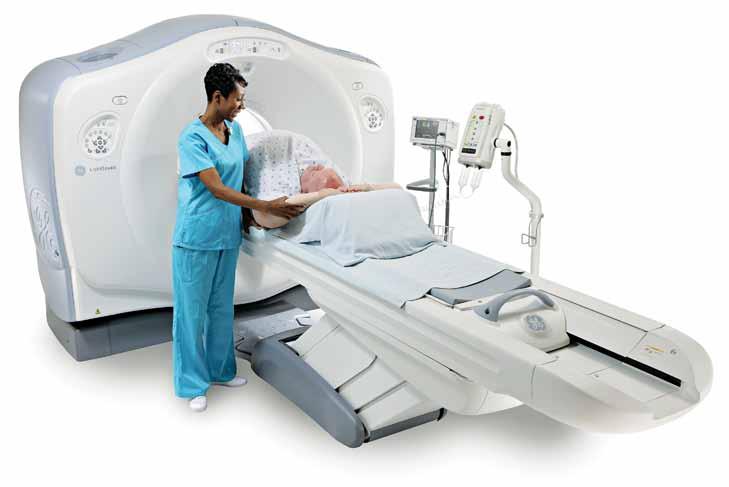
3 minute read
CT SCANS
NEW ct SCANNERS
reduce radiation, cancer risk
By Burke Watson

in the past 18 months, research study findings and major television news reports have focused on radiation exposure from computed tomography (CT) scans. A valuable diagnostic tool, CT scans provide detailed views from deep within a patient’s body. But they require much higher radiation doses than conventional X-rays, creating growing concern among researchers that CT scans may contribute to an estimated tens of thousands of future cancer cases.
The Methodist Hospital System® has taken a leading role in adopting new technology that dramatically reduces the amount of radiation in CT scans while still producing the clear images doctors need to diagnose and treat many serious health problems.
The Methodist Hospital adopted the latest advance in CT technology in late 2009 with new scanners by GE that experts say can reduce the radiation dose by 30 to 40 percent.
Employing newly developed software, the scanners use less radiation to produce images, then refine them to the clarity doctors need. Researchers study radiation dosage
Two recent studies have reported that as CT scans have become more widely used in the United States — from about 3 million in 1980 to nearly 70 million in 2007 — the radiation dosage used tends to vary widely, depending upon the type of scan being done. This variation may contribute to a significant number of future cancer cases.
Dr. Thomas Hedrick, medical director of Radiology for Methodist, says he understands the concern among researchers and patients.
“I think it’s realistic for people to want to know more about this,” says Hedrick, who this summer will celebrate his 30th anniversary as a member of the Methodist medical staff. “Five years ago, patients almost never asked about the amount of radiation. In the past year to two years, the amount of concern has increased exponentially.”
Publicity was generated about three years ago after the American College of Radiology decided to study the issue, Hedrick says. And, he adds, public interest has been further stoked by the news reports about radiation exposure from CT scans.


New technology lowers exposure
In response to growing concerns about radiation risks, CT manufacturers have made improvements that lower the radiation dose, while still providing physicians the sharp images they need for diagnosis, Hedrick says. The advances include a CT scanner that automatically adjusts the level of radiation used in a scan, depending on the area of the body that is being examined. For example, a lower dose is needed for the chest than for the abdomen, which has more soft tissue for the radiation to penetrate. “If you didn’t have this software, you’d need significantly more radiation to get the same image,” Hedrick says. “We’ve had this technology on board since November and we haven’t seen any decrease in image quality.”
Seven of the CT scanners with this capability are in operation at Methodist’s locations throughout the Houston area, and four more are scheduled to be in place by the end of this year. Hedrick says radiologists throughout The Methodist Hospital System conduct more than 150 CT scans per day. n
Photo courtesy GE Healthcare

&hEaRt VaScuLaR ScREEninG PackaGES
It’s quick, noninvasive and could save your life.
cardiovascular disease is the leading cause of death for men and women. heart & Vascular Screening Packages at the Methodist heart & Vascular center can help you better understand your risk factors for cardiovascular disease. these scans are quick, noninvasive and could save your life. Screening could be covered by your insurance.











